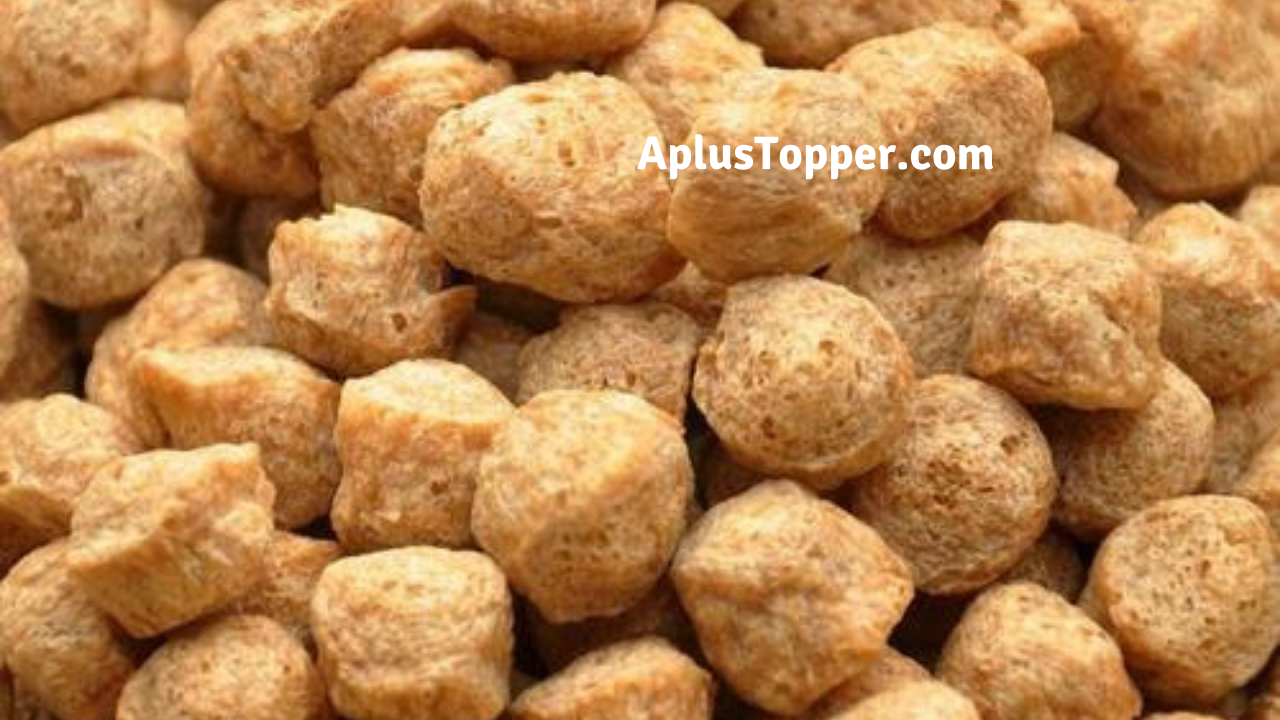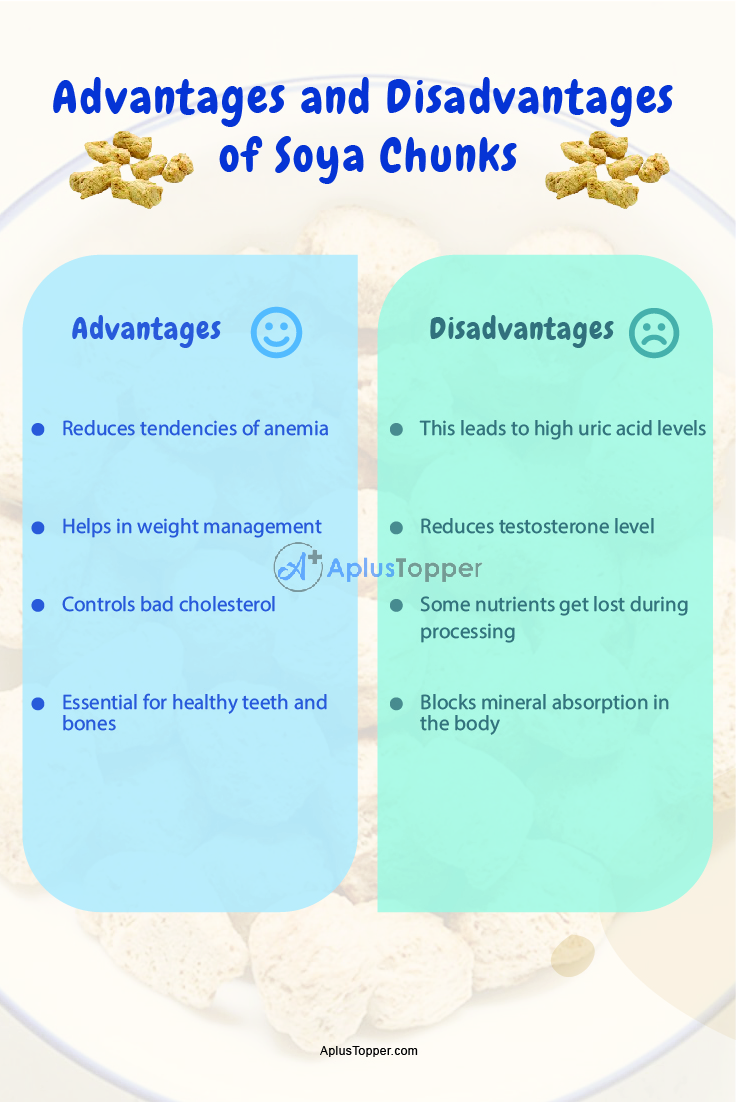Soya Chunks Advantages and Disadvantages: Have you parted ways with your favourite meat due to the Covid-19 pandemic? Do not worry then; soya chunks or soya nuggets are the perfect substitutes for you! Or, are you a vegetarian looking for rich proteins? Then also, these nuggets are perfect for you. These protein-rich chunks are extremely tasty, and all of us love to eat them. These chunks are quite healthy for you as it contains all the rich amino acids, and are also quite known to lower your cholesterol levels.
Students can also find more Advantages and Disadvantages articles on events, persons, sports, technology, and many more.
What is Soya Chunks? Advantages and Disadvantages of Soya Chunks 2021
Made from soy flour, soya chunks are formed by defatting. Oils are removed, which leaves out all the byproducts and ends up giving a rough texture to them. Soya chunks are often compared to several nutritional non-vegetarian food items because of their rich protein value. These versatile chunks are often tagged to be ‘vegetarian’s meat’, and the byproducts that are left from defatting include fibre, antioxidants, phytoestrogens, and other fatty acids. Do you know that in about 100 grams of these delicious soya chunks, you will get at least 345 calories? Of these 345 calories, there will be 52 or 53 grams of rich protein, 10 milligrams of iron, 400 grams of calcium, about 0.1 grams of fat, and so much more!
Benefits and Limitations of Soya Chunks
- Advantages of Soya Chunks
- Disadvantages of Soya Chunks
- Comparison Table for Advantages & Disadvantages of Soya Chunks
- FAQs on Pros & Cons of Soya Chunks
Advantages of Soya Chunks
Soya chunks have so many advantages. They are healthy and delicious at the same time. Its advantages are.
- Provides relief to sleep disorders: Sleep disorders can be effectively treated by having soya chunks in your diet. This is, broadly speaking, one of the most noteworthy and crucial benefits of keeping a diet of soya chunks. These tasty mini chunks are high in essential minerals like magnesia, which act effectively against insomnia.
- Helps in diabetes: Numerous studies have found that if you have soya chunks somewhat regularly, then it will effectively reduce your chances of getting diabetes. These nutritious chunks will increase those insulin receptors in your body, which will prevent diabetes. So now you can have more soya chunks to control your blood sugar level.
- Remedy to prevent anemia: As said earlier, soya chunks are high in iron, so it is quite evident that it will prevent anemia. This iron helps in the formation of myoglobin and hemoglobin in your body. Do you know, there are so many athletes who have a diet rich in soya chunks? It also provides immunity to your body.
- Helps in proper weight management: Being quite rich in essential proteins and fiber, keeping soya chunks in your diet will help you to manage your weight loss. This is so because soya chunks make you feel full for extreme lengths of time.
- Extremely essential for pregnant women: Soya chunks are quite rich in folic acid, as well as vitamins like B complex. These are quite essential for women who are going through pregnancy. Most doctors suggest pregnant women take on an organic diet rich in soy-based foods.
- Makes bones and teeth healthy: Being rich in calcium and iron, soya chunks are extremely effective for making bones and teeth quite healthy. It helps prevent osteoporosis and will also help in the proper growth of bones and teeth.
- Helps in lower the level of cholesterol: Your body has both good and bad cholesterols, and soya chunks are quite effective in reducing the bad ones. Soya chunks themselves have nil cholesterol, and thus it will also reduce the chances of heart diseases.

Disadvantages of Soya Chunks
Although soya chunks have many merits, yet there are certain demerits to having soya chunks as well. These are listed below for you.
- Processed food: Soya chunks are processed foods, and so they might be of lesser nutritional value. The oil and salt which is added while processing these chunks may cause the nutrients to wear off. When consumed in excess, this can ham your body and heart health too.
- Mineral absorption can be blocked in your body: Of all the essential nutrients and minerals that soya chunks have, it also contains phytates. Phytates are the main reason behind blocking the mineral absorption in your body. These fatty acids are not so good for health.
- May lower your level of testosterone: Not that there are researches that can prove this, yet it is doubted very much that too much soya chunk consumption can lower your testosterone levels. This might not happen if you are consuming a little of it, but too much consumption is considered to be leading to reduced testosterone. On the one hand, it is rumoured to be reducing testosterone, while on the other hand, it also increases the level of cortisol release. If you are consuming soya chunks after working out, then especially it might lead to increased cortisol levels.
- Might increase the level of uric acid in your body: Too much soy consumption can definitely lead to high levels of uric acid. Too much uric acid is definitely disastrous for your health, as it has numerous side effects. It can cause weight gain, bloating, facial problems like acne or pimples, and even frequent mood swings.
Soya Chunks Advantages and Disadvantages in tabular form
| Advantages | Disadvantages |
|---|---|
| High protein content: Soya chunks are a rich source of plant-based protein, with up to 52 grams of protein per 100 grams of soya chunks. | Digestive issues: Some people may experience digestive problems such as gas, bloating, or diarrhea after consuming soya chunks. |
| Low in fat: Soya chunks are low in fat, making them a good food option for those watching their weight or looking to maintain a healthy diet. | Allergies: Soya allergies are relatively common, so people with soy allergies should avoid soya chunks. |
| Versatile: Soya chunks can be used in a variety of dishes, such as curries, stir-fries, and salads, making them a great addition to any meal. | GMO concerns: Most soybeans grown today are genetically modified, so some people may have concerns about the use of GMOs in soya chunk production. |
| Nutrient-dense: Soya chunks are a good source of several important nutrients, including iron, calcium, and vitamin B12. | Processing concerns: Soya chunks are highly processed, and some people may have concerns about the use of chemicals and additives in the production process. |
| Affordable: Soya chunks are an inexpensive source of protein, making them a budget-friendly option for many people. | Flavor concerns: Some people may find that soya chunks have a bland or unappealing taste, which can be a drawback when trying to incorporate them into meals. |

Comparison Table for Advantages & Disadvantages of Soya Chunks
| Advantages | Disadvantages |
| Reduces tendencies of anemia | This leads to high uric acid levels |
| Helps in weight management | Reduces testosterone level |
| Controls bad cholesterol | Some nutrients get lost during processing |
| Essential for healthy teeth and bones | Blocks mineral absorption in the body |
FAQ’s on Pros & Cons of Soya Chunks
Question 1.
On a per-day basis, how much soya chunk can I have in my diet?
Answer:
Much like other foods, moderation is the most important key here. According to several dieticians, each day, you can have about 25 or 30 grams of this nutritious food. This much soya chunk in your diet will not lead to a harmful increase in the level of estrogen. This much quantity will also not be increasing the level of uric acid in your body. Many doctors are of the suggestion that you should always prefer the home-cooked version of these chunks. This will make you absorb most of the nutrients, and you will be able to reap the most of it. The home-cooked version is not unhealthy, and you will be able to get all the health benefits from it.
Question 2.
What side effects do soya chunks have on the body?
Answer:
There are mild side effects of having soya chunks in large quantities. They can cause health issues like nausea or bloating. Sometimes people may be allergic to soya chunks, and they fail to realize it. In such people, consumption of soya chunks can lead to severe itching, rashes on the body and even anaphylaxis. You might also experience some level of tiredness, and some people have reported that the consumption of excessive soya chunks has affected their thyroid functioning.
Question 3.
What are some good substitutes for soya chunks?
Answer:
If you are a non-vegetarian, then you can easily substitute soya chunks with some form of meat. However, in case you are a vegetarian, the other options that you have are tofu or tempeh. You can also substitute a soya chunk diet with cottonseed meals or even a peanut meal. All of these are protein-rich diets and will benefit you.

